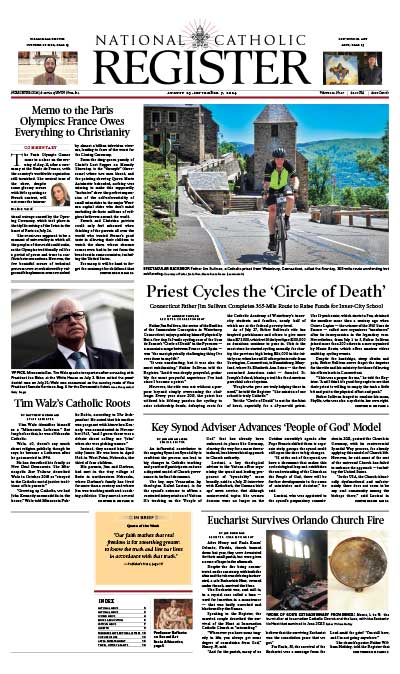6 Ways to Keep the Revival Alive
COMMENTARY: The 10th National Eucharistic Congress was a sight to behold. The faithful must carry this fervor beyond Indianapolis — and beyond the 2025 conclusion of the Revival.

The 10th National Eucharistic Congress was a sight to behold. The fervor over the Real Presence which U.S. Catholics have displayed since the 2021 kickoff has been astounding.
And with the Pentecost send-off of thousands of pilgrims from the four major points on the compass, converging in Indianapolis for five days July 17-21, the stage seems to be set for an outpouring of God’s grace that the Church in the U.S. sorely needs.
The faithful must carry this fervor beyond Indianapolis — and beyond the 2025 conclusion of the Revival.
How do we keep the momentum of revival going?
Has the Church become more rooted in its Eucharistic identity, and has understanding of and participation in the sacramental life increased? Are the faithful deepening their love for the Eucharist and encountering the Eucharistic Lord through the liturgy and private prayer? What areas of catechesis are still needed?
Recent polls disclose churches are still struggling to regain their pre-pandemic Mass attendance. Though a 2023 Gallup study reveals more Catholics believe in the Real Presence (64% as opposed to the 33% reported by the 2019 survey), only a small percentage — one-third — attend Sunday Mass. This suggests a disconnect between the faithful’s belief in the Eucharist and their understanding about the Mass, its mysteries, and their participation in the Church’s sacramental life. It necessitates that the Eucharistic Revival’s work includes further Eucharistic preaching and catechesis, even after the Revival ends.
In 2007’s Sacramentum Caritatis, Pope Benedict XVI outlined six practical strategies to foster Eucharistic devotion that the Church can implement to keep the Eucharistic Revival alive.
1. Continue Eucharistic preaching, focused on instruction on the liturgy and its beauty.
The Mass, the highest form of prayer, is perhaps the most misunderstood prayer. Hence, preaching must center on the liturgy, its mysteries and its prayers to develop a deeper appreciation for God’s work in the liturgy and in one’s own life. This fosters a deeper Eucharistic reverence, for, as Eucharistic people, we are meant to live the Mass. Through preaching and offering resources such as The Mass Explained, the faithful, touched by the liturgy’s beauty, will desire participation in God’s salvific work and hunger to receive the spiritual food that never perishes.
2. Renew the sacrament of penance.
As one must be in the state of grace to receive Communion, the Eucharist and penance must not be separated. St. Irenaeus preached that “the glory of God is man fully alive.” On the cross, Christ suffered and died for man to experience the life, glory and vision of God. The more we live in the state of grace, the more we live in union with God. The more we receive Christ in the Eucharist, becoming connatural with him, the more we are fully alive. This is true freedom, and losing sight of this has dire consequences.
Pope Benedict XVI warned that “the loss of consciousness of sin always entails a certain superficiality in the understanding of God’s love.” By disregarding sin and its harmful effects, we separate ourselves from God and mar our understanding of God’s love that we encounter in the Eucharist.
3. Foster the practice of gaining indulgences.
Obtaining indulgences reinforces truths of the Eucharist and the sacrament of penance: that we are united to each other and that by ourselves we cannot repair the temporal punishment incurred by our sins.
Pope Benedict instructed that because “the conditions for gaining an indulgence include confession and receiving sacramental communion, this practice can effectively sustain the faithful on their journey of conversion and in rediscovering the centrality of the Eucharist in the Christian life.”
4. Pray with God’s word.
Pope Benedict teaches that God speaks in the present, as his presence in the liturgy attests. Lectio divina (prayerful reading of Scripture) and praying the Liturgy of the Hours immerses the faithful in God’s word, nurturing receptivity in finding and listening to God through Scripture.
This attentiveness to God’s word enriches one’s participation in the liturgy, as the faithful will hear God speak to them through the readings and prayers of the Mass.
5. Reinstate Sunday as a day of rest.
Observing the Lord’s Day recalls that we are made for the heavenly banquet and aids us in reorientating our week to God. Centered upon the Eucharist and sharing in the communal life of the Church, Christians rediscover “the Eucharistic form which their lives are meant to have” and respond by making their lives a continual self-offering to God.
6. Offer and encourage private prayer before the Eucharist.
Parishes must catechize the faithful on the beauty of Eucharistic adoration and must nourish the souls of the faithful by making the Eucharist accessible to their parishioners.
Parish Holy Hours, weekly adoration, First Friday all-night adoration, annual 40 Hours devotion and Eucharistic processions provide opportunities for the faithful to meet the Eucharistic Lord in prayer and rest in his presence.
By catechizing the faithful and implementing these six practices, the Church will, long after the mountaintop experience of the Eucharistic Congress and Revival, continue to build a greater belief, reverence and love for the Eucharist, while inciting the desire for all Catholics to live their faith by participating in the sacramental life of the Church.
Maria Cintorino teaches at a Catholic school in northern Virginia. She graduated from Christendom College with a bachelor’s degree in theology and a minor in philosophy.















